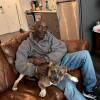As national models project fewer coronavirus deaths in the United States than previously expected, signaling that social distancing and other mitigation efforts are working to slow the growth of the epidemic, the dean of Boston University’s School of Public Health said it’s still too soon to celebrate — particularly in Massachusetts.
“The projections are that in the next seven days, we’ll see the peak [in Mass.],” Dr. Sandro Galea told Emily Rooney Thursday on WGBH News’ Greater Boston.
“Now, the bad news about that means the next seven days will be the worst seven days. … That’s when we’re going to see the most cases, we’re going to see the most people severely affected. The good news is that, past that, we should be entering a period of relative slowing,” he said.
Galea, an epidemiologist, explained how researchers came to these predictions.
“The way we know is measuring how the virus is spreading. We have other diseases and other viruses and we learn from them. And we also learn from other countries … what the shape of the epidemic looks like,” he said. “That means, how fast it’s spreading, and as a result of how fast it’s spreading, what might happen tomorrow and next week. … It’s cautious good news.”
Galea said that we’ll be able to get better handle on the disease when the federal government makes up for its initial shortcomings.
“Let’s not forget one of the challenges we’ve had right now, is that we’ve had a really poor and poorly coordinated federal response,” he explained, citing a shortage of tests and testing equipment.
“So my hope is — as we develop the technology … as we get better at the symptom screening, case identification, contact tracing — we will be able to, as a society, continue operating while also being prepared to protect ourselves from this,” Galea added. “If we do that, we can avoid these really large-scale, blunt measures that we’ve taken as a society, that have really shut society down.”
Galea also addressed newly released data from the state’s Department of Health and Human Services, which breaks down some of the state’s coronavirus cases and deaths by race and ethnicity. The state’s disclosures followed the release of the same metrics from other states, which found black communities were affected by the pandemic at disproportionately high rates.
“It actually shows no particular disparity yet, in terms of race and ethnicity in Massachusetts, which is different than we’ve seen in other states. And I would expect that to change,” he said. “We need to be very conscious of the fact that people who are vulnerable already are the ones who are more vulnerable to the virus. … I think we have a responsibility, collectively, to make sure we do everything we can to help those who are already marginalized.”
Galea said he is particularly worried about the state’s homeless population.
"If you’re homeless at this point, you are extraordinarily vulnerable. And we should not be in a position of saying [to] someone who’s homeless, ‘find someplace else.’ It’s on us to create those opportunities for the homeless,” he said. “We, as a Commonwealth, have a responsibility to create the beds and create the opportunities so that everybody can be safe from a pandemic like this.”



